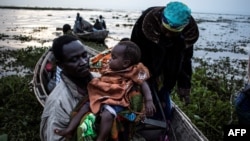The Democratic Republic of the Congo, or DRC, is in the midst of one of the largest and most serious humanitarian crises in the world. In the last year, violence has surged and spread to previously peaceful areas like the Kasai region, adding to the devastation brought on by two decades of conflict in other parts of the country. About 4.5 million people are displaced by violence in DRC and 13.1 million need humanitarian assistance.
The crisis in DRC is an urgent priority for the United States, which has provided millions of dollars to the DRC, to alleviate suffering and foster economic development. “But they are being robbed of their full value by crisis, conflict, and poor governance,” said USAID Administrator Mark Green.
The conflicts both in the Kasai region, as well as in the country’s eastern provinces, have deteriorated humanitarian conditions and left 7.7 million people facing severe food insecurity.
This is an international crisis. “Brutal policies, sweeping corruption, poor governance and simmering conflict have displaced millions ... Hundreds of thousands have fled into neighboring countries, imposing new burdens, and risking regional instability.”
The scope of human suffering is breathtaking, with more than one in ten now in need of vital assistance. And while it’s true that the situation in the DRC is complex, that is no excuse to not act. Humanitarian groups are working tirelessly to reach vulnerable families with lifesaving assistance, even as insecurity, attacks on relief workers, and bureaucratic impediments continue to make DRC a challenging operating environment. “We may not have all the answers, but we do know what isn't working -- the status quo,” said Mark Green.
Therefore, the United States suggests taking the following steps.
First, the DRC must hold credible elections this calendar year.
Second, the government must foster conditions that make true democracy possible, including immediately making clear to citizens that they are free to express their will and choose their own future.
Third, the government must guarantee the safety of humanitarian workers. Last year, 158 security incidents targeting humanitarian workers were reported. Two UN experts were abducted and killed.
And finally, because an international crisis requires an international response, we call on other countries to step forward and do more to help. “This demand begins with the government itself. It has done so little to alleviate suffering, even as many of its leaders have apparently been lining their own pockets,” said Administrator Green.
“True compassion requires more than providing money. It requires us to use our collective influence to demand concrete actions that will end cycles of misery. We call for these demands because they will offer the people of DRC their first real hope of a brighter future.”




